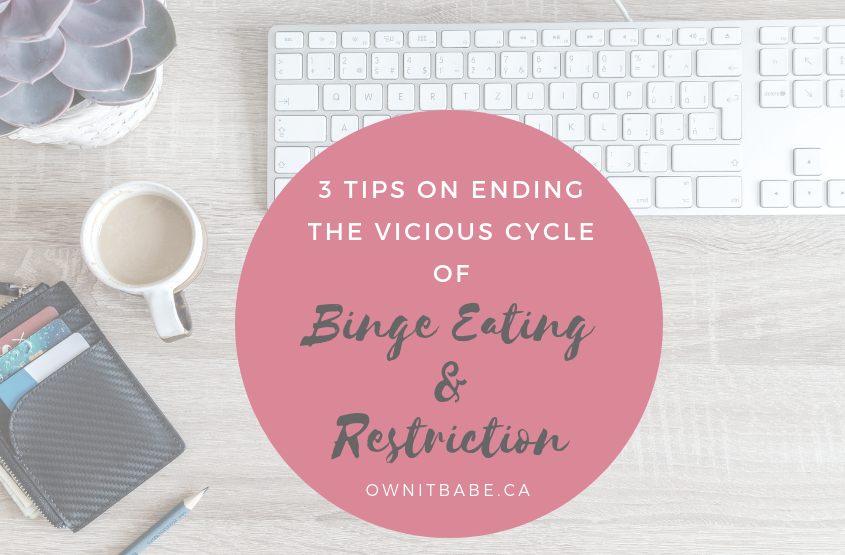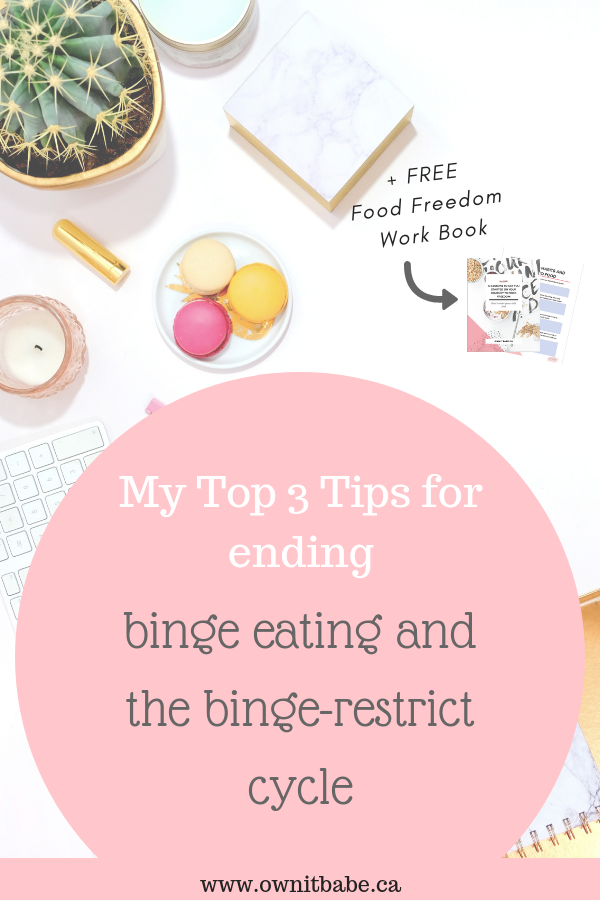
My Top 3 Tips for ending binge eating and the binge-restrict cycle
binge eat·ing (noun) = the consumption of large quantities of food in a short period of time, typically as part of an eating disorder.
I have openly shared my experience with binge eating and extreme hunger before, because I always get asked how I stopped binge eating.
In this article, I want to give you my Top 3 Tips on how I ended the cycle of binge eating and found freedom and peace with food, so you can understand:
…why your body drives you to eat large quantities of food
…the role your brain plays in all of this
…how to stop the binge-restrict cycle in its tracks
[Keep in mind that I am not a licensed therapist or doctor, so this is strictly based on my own experience and scientific research.]
Tip #1: Understand that binge eating is your body’s survival mechanism
The reason 95-98% of all diets fail is that our bodies are pretty dang smart. As soon as we consciously choose to skip meals or restrict our food intake, whether this is based on the desire to lose weight or suppressing our hunger due to other circumstances in our life (such as grief, loss, anxiety, depression, illness), our body will outsmart us eventually.
Our body’s number one job is to keep us alive. Through thousands of years of evolution, our bodies are primed to respond to periods of starvation with an increased desire to eat. (Side note: This is literally why us humans are still alive today!)
This means that whenever you choose to restrict your food intake, your brain will communicate with the rest of your body to prime you to seek out food and eat more. (Read my experience here)
You may find yourself constantly thinking about food, potentially engage in harmful behaviours to try and “manage your hunger” and generally feel as if you are always hungry.
Only when your body feels safe will this obsession come to an end. For this to happen, we have to feed our body consistently and create a mindset of abundance around food, not scarcity.
During my eating disorder recovery, I constantly reminded myself of this mantra: “Abundance, not scarcity.”
It really helps in giving yourself permission to eat whatever you want, whenever you want. This is the only way for your body to eventually stop fearing its survival. This is when my food intake and cravings naturally balanced out over time.
Tip #2: Don’t skip meals or compensate for the food you ate
If a binge occurs, the number one rule is to not plan your next diet-attempt or workout to “make up for it”. This is exactly what kept me in this binge-restrict cycle for 10+ years.
If you find yourself eating past the point of fullness, take a deep breath, remind yourself of the abundance-mindset you are trying to create and let go. Move on.
The more you stop compensating for the food you eat and just continue on with your day like nothing happened, the safer your body will feel. Your brain then essentially communicates to the rest of your body that it’s safe enough to slowly balance out hormones, hunger, fullness and other physiological symptoms that may come up as a result of the binge-restrict cycle.

Tip #3: Work on letting go of mental deprivation and the diet mentality
In the beginning stages of my recovery and transition to intuitive eating, I found myself eating A LOT of food. Even though I reminded myself of the abundance-mindset and committed to never compensating for the food I ate anymore ever, my body still asked for thousands upon thousands of calories every single day for a few months.
But, eventually, the extreme hunger stopped. It didn’t abruptly stop one day, but my hunger lessened and balanced out more and more with time.
This is why working on letting go of the diet mentality is so important.
What I mean by mental deprivation is this: Physical deprivation means you physically restrict calories. Mental deprivation means that you attempt to restrict, feel guilty or ashamed for eating certain foods and generally always plan your next diet. Mental deprivation is what caused me to consistently have my “last binge ever”… It was a huge cause for my binge-restrict cycle, because I felt as if I had a limited opportunity to eat what I wanted, so I had to eat as much as possible right now.
Mental deprivation creates a mindset of scarcity, which then fires up your body’s survival mechanisms.
We want to instead let go of any future attempts to diet and let our body find its natural weight set-point over time. Food and rest was my best friend during those first few months in recovery and my body thanked me for it big time.
A quick word on “healthy weight loss”
A lot of people ask me: “Isn’t there a healthy way to lose weight where I don’t obsess over food? I want to be healthy.”
My answer to this is that being healthy is all about healthful behaviors you engage in, not the body shape you have.
So, if health is your goal, I recommend reading this article and this article to find healthful, but weight-neutral ideas to support yourself throughout your journey.
Aside from the tips in these two articles, my Top 3 weight-neutral, healthful behaviours are:
Hydrate your body. Get enough sleep. Manage your stress and take care of your mental health (the articles have some awesome tips for this).




